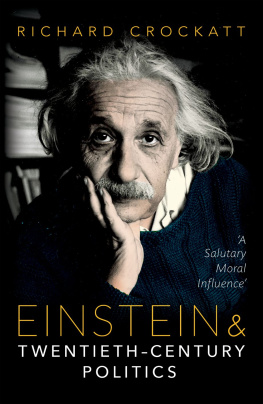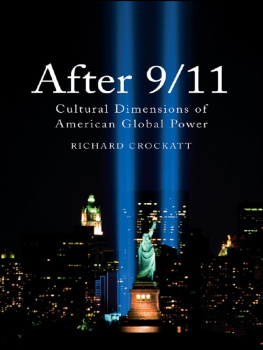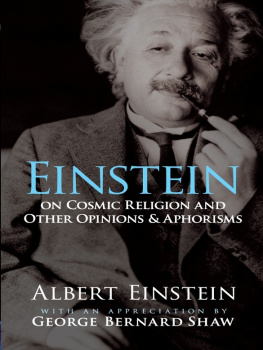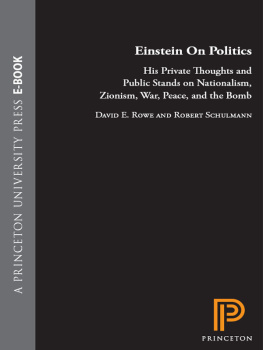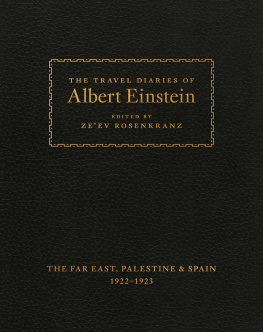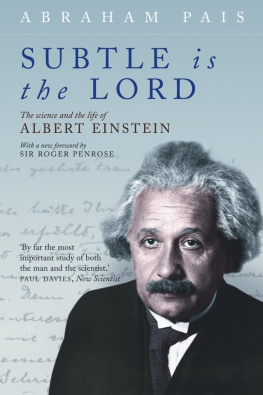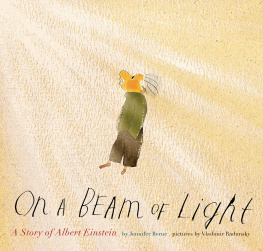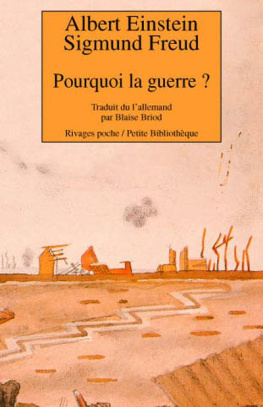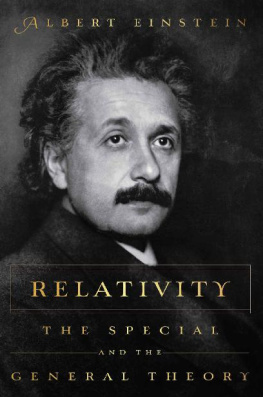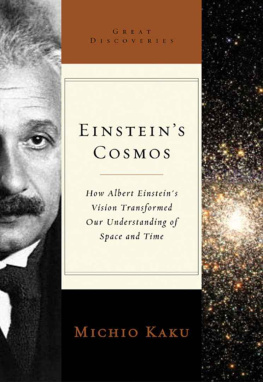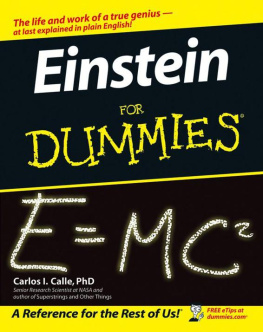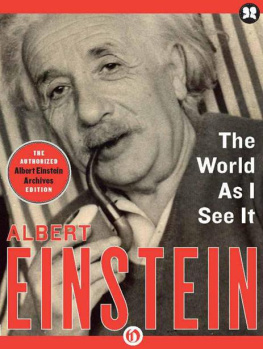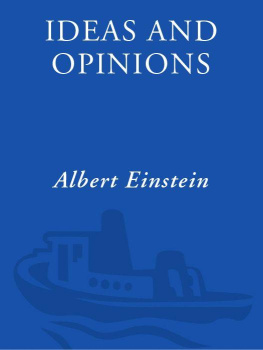Einstein and Twentieth-Century Politics

Great Clarendon Street, Oxford, OX2 6DP, United Kingdom
Oxford University Press is a department of the University of Oxford. It furthers the Universitys objective of excellence in research, scholarship, and education by publishing worldwide. Oxford is a registered trade mark of Oxford University Press in the UK and in certain other countries
Richard Crockatt 2017
The moral rights of the author have been asserted
First Edition published in 2017
Impression: 1
All rights reserved. No part of this publication may be reproduced, stored in a retrieval system, or transmitted, in any form or by any means, without the prior permission in writing of Oxford University Press, or as expressly permitted by law, by licence or under terms agreed with the appropriate reprographics rights organization. Enquiries concerning reproduction outside the scope of the above should be sent to the Rights Department, Oxford University Press, at the address above
You must not circulate this work in any other form and you must impose this same condition on any acquirer
Published in the United States of America by Oxford University Press 198 Madison Avenue, New York, NY 10016, United States of America
British Library Cataloguing in Publication Data
Data available
Library of Congress Control Number: 2016934371
ISBN 9780198785491
ebook ISBN 9780191088292
Printed in Great Britain by Clays Ltd, St Ives plc
Links to third party websites are provided by Oxford in good faith and for information only. Oxford disclaims any responsibility for the materials contained in any third party website referenced in this work.
This book is for Julia
Acknowledgements
This project began when, during an extended stay in Jerusalem, I found I was living within walking distance of the Albert Einstein Archive at the Hebrew University of Jerusalem. As a historian of the cold war I had long been interested in the politics of the A-bomb and knew of Einsteins part in alerting Franklin Roosevelt to the possibility of nuclear fission, which led to the Manhattan Project and ultimately to the bombs of Hiroshima and Nagasaki. My initial idea was simply to look at the original of Einsteins letter to Roosevelt and some of the surrounding documentation. Soon I found myself straying into neighbouring topics and in the end to the full range of Einsteins political and social interests. There was far more to discover than I had imagined. Without the help of Barbara Wolff, the Archives Information Officer, this process would have been immeasurably more difficult and time-consuming. Beyond helping me to find my way around the Archive, she repeatedly encouraged, challenged, and corrected me on matters large and small when I floated ideas to her or showed her draft chapters. Whether she will be satisfied with everything I have done is another matter. Whatever the case, my debt remains large. As always in such situations, however, I take full responsibility for the end result. Thanks are due also to Dr Roni Grosz, the Curator of the Archive, and to Chaya Becker, his assistant, who helped to make my visits to the Archive a pleasure rather than a chore. I am grateful for permission to quote from the Archive.
I owe a special debt to Richard King, who read an early draft of and to Lydia Goehr for putting me in touch with him. Needless to say, none of the above can be held responsible for the uses I have made of their invaluable help.
I owe a different kind of debt to Bootham School, where in the early 1960s I was exposed to the Quaker ethos of liberal internationalism. For me that ethos was most fully embodied in one particular teacher, John Kay, whose enthusiasm for the French Enlightenment and the tradition that flowed from it has stayed with me. That he had served in the Friends Ambulance Unit in the First World War offered at least a distant link with the war that Einstein opposed with such fervour and was the primary cause of his politicization. In reconstructing what in this book I call the liberal international of the first half of the twentieth century, of which Einstein was such a prominent member, I am drawing heavily on my own liberal education received over fifty years ago.
I am grateful to anonymous readers at Oxford University Press for their thoughtful comments. Robert Faber at OUP has proved an unfailingly supportive editor, as has Cathryn Steele. Warm thanks are also due to the rest of the editorial staff at OUP who worked on the book, especially Hilary Walford, who copy-edited the text with skill and patience, and Vaishnavi Ananthasubramanyam who expertly oversaw the final stages of the production process. I have been struck in writing this book by the generosity of friends and family, who regularly sent me material on Einstein whether of a scholarly type or from the press and other media during the centenary year of the General Theory of Relativity (2015). It seems everyone likes Einstein, illustrating one of the themes of this book, which is the magnetic power of the man, his ideas, and his image. Philip Feldman drew my attention to the essay on Einstein by C. P. Snow, and my brother Philip alerted me to an important item on Einstein and Freud. My father, John Crockatt, sent whatever came his way on Einstein and shared with me his experience of tackling Einsteins own book on the theory of relativity. Barry Sheridan and Amira Katz-Goehr also supplied me with references to current material on Einstein. I have benefited greatly from conversation with Del Hawley, whose understanding of mathematics and physics has conveyed to me the excitement of Einsteins world. My book is about Einsteins politics, but no one can spend this amount of time studying Einstein without engaging at some level with the science. Clive Scott helped out with translation of a passage in French. All family members not mentioned above, both Crockatts and Goehrs, deserve thanks for their continual support and interest in the project. My largest debt is to Julia, who pushed me at critical junctures to continue with the book when I could not see a way forward and provided a sounding board for my ideas as well as moral and other support every step of the way. For this, as always, I am eternally grateful.
Contents
| ACCF | American Committee for Cultural Freedom |
| ADA | Americans for Democratic Action |
| AEA | Albert Einstein Archive, Hebrew University, Jerusalem |
| CCF | Congress for Cultural Freedom |
| CIC | Committee on Intellectual Cooperation |
| CPAE | Collected Papers of Albert Einstein |
| CPUSA | Communist Party of the USA |
| CRC | Civil Rights Congress |
| ECAS | Emergency Committee of American Scientists |
| ECLC | Emergency Civil Liberties Committee |
| FAS | Federation of American Scientists (originally Federation of Atomic Scientists) |
| FBI | Federal Bureau of Investigation |
| HUAC | House Un-American Activities Committee |
| JTA | Jewish Telegraphic Agency |
| MLN | Modern Language Notes |
| MR | Monthly Review |
| NAACP | National Association for the Advancement of Colored People |

